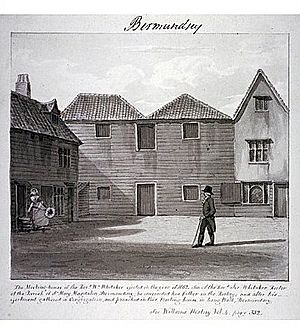William Whitaker (Puritan ejected minister) facts for kids
William Whitaker (1629–1672) was an English Puritan leader and minister. He was known for his strong religious beliefs and for being one of the ministers who lost their jobs because of new laws about religion.
Contents
Early Life and Education
William Whitaker was born in Oakham, Rutland. His father, Jeremiah Whitaker, was also a minister. When William was 14, he started studying at Emmanuel College, Cambridge. He was very good at languages there. He earned his first degree (B.A.) in 1642.
A couple of years later, in 1644, he became a Fellow at Queens' College, Cambridge. This meant he was a senior member of the college. He earned his master's degree (M.A.) in 1646.
Becoming a Minister
In 1652, William Whitaker became a minister. His first church was in Hornchurch, Essex. In 1654, he took over from his father as the minister at St Mary Magdalen, Bermondsey.
Challenges for Ministers
After King Charles II returned to the throne in 1660 (this was called the Restoration), new laws were made about religion. One important law was the Act of Uniformity 1662. This law made it harder for ministers to keep their jobs if they didn't follow the Church of England's rules exactly.
William Whitaker was one of the ministers in London who spoke out against this new law. Because he disagreed with the Act of Uniformity, he was "ejected" from his church. This meant he lost his official job as a minister.
Leading a New Congregation
Even after losing his church job, William Whitaker continued to lead religious services. He gathered a group of people who shared his beliefs. They met in a small building called a meeting-house in Long Walk, Bermondsey.
For many years, he also taught young people who wanted to become ministers. Some of his students even came from other countries. He also took part in secret religious meetings, called conventicles, at the home of Frances Cecil, the Dowager Countess of Exeter. Other important religious leaders like Thomas Jacomb and Matthew Poole were also part of these meetings.
William Whitaker passed away in 1672. Another well-known minister, Samuel Annesley, gave the sermon at his funeral.
Published Works
William Whitaker's ideas and teachings were shared through his sermons. Two of his sermons were included in a collection called Morning Exercises, put together by Samuel Annesley.
In 1674, after his death, eighteen of his sermons were published. His widow published them, and they included a special message to Elizabeth Cecil, Countess of Exeter. The book also had a description of William Whitaker's character written by Thomas Jacomb.
 | Claudette Colvin |
 | Myrlie Evers-Williams |
 | Alberta Odell Jones |


